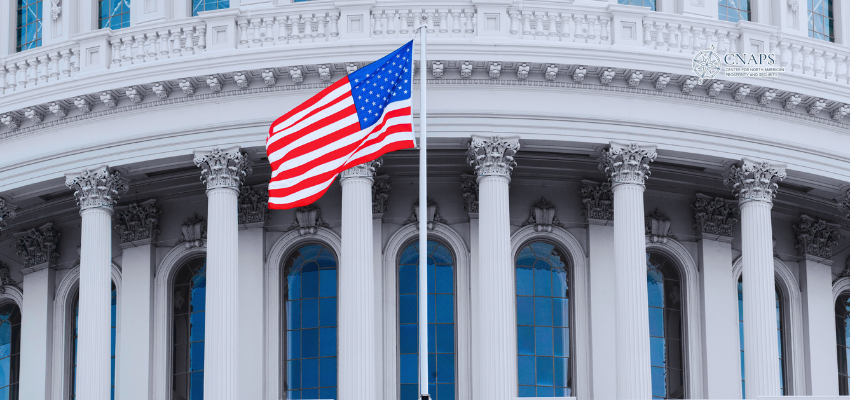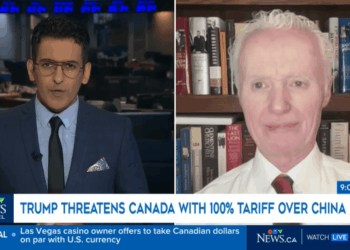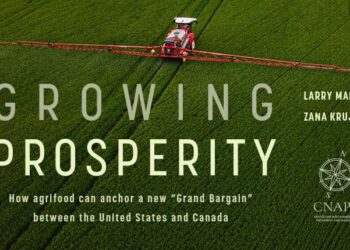This article originally appeared in The Daily Economy.
By David Collins, June 24, 2025
The One Big Beautiful Bill Act (OBBBA), intended to lower the tax burden for Americans and thus to stimulate growth, contains one provision that has caused much alarm in Canada — potentially imposing a punishing tax on Canadians who invest in US companies. Canadian individuals and entities could face increased US withholding tax rates of 30 percent or more on US-source dividends, interest, royalties, and capital gains on real estate. The financial implications are severe, conceivably gutting Canadian pension funds that are normally tax exempt.
Section 899 of the OBBBA, passed by Congress last month and currently before the Senate, is expressly designed to hurt investors from countries that impose what the legislation terms “unfair” foreign taxes. The OBBBA defines these taxes as those which are exclusively or predominantly applicable to non-resident individuals and foreign corporations or partnerships because of the application of revenue thresholds or exemptions that ensure that substantially all residents other than foreign corporations and partnerships supplying comparable goods or services are excluded. This language could hardly be clearer; it is an obvious reference to Digital Services Taxes (DSTs).
Canada instigated its DST last year, purportedly to address the concern that the world’s biggest tech companies do not pay their fair share of tax because they are able to locate their head offices in low tax jurisdictions while serving clients around the world. Canada’s DST applies to large businesses, ostensibly foreign and domestic, that meet both of two revenue thresholds: total global revenue of €750 million or more in a fiscal year; and greater than CA$20 million in earnings in Canada in the calendar year. The tax applies at a rate of three percent on profits over CA$20 million.
The DST disproportionately impact US companies, an unfortunate, if unintentional, consequence of outcome-based equity-minded policymaking. The US launched a complaint against Canada’s DST last August via the United States Mexico Canada Agreement (USMCA), the Services chapter of which prohibits discrimination between foreign and local services or services suppliers.
While it is arguable that Canada’s DST is indeed discriminatory against US companies, Canada could seek to raise a USMCA complaint of its own against the OBBBA withholding tax. The USMCA’s Investment chapter prohibits discrimination against foreign investors, with investment broadly defined to include shares in US companies and various other assets which would probably be caught by the Section 899 withholding tax.
In other words, Canadian legislation that violates an international treaty will be countered by US legislation which is illegal under the same treaty. The situation does not inspire much confidence in the two countries’ respect for international law. The respective taxes are yet more levers in an age of brazen unilateralism, not to mention trade protectionism.
Investors from Canada are not the only targets of the OBBBA. Many countries impose DSTs, using identical wording based on the OECD model. OBBBA Section 899 goes on to state that:
he Secretary shall issue … regulations or other guidance which list the discriminatory foreign countries … in guidance, … update such guidance on a quarterly basis… [and] exercise the authority to provide exceptions [emphasis added].
This leaves the door open for the US to impose higher withholding taxes on investors from certain countries, much as President Trump has done with tariffs, or to exempt some countries entirely. The variable application of the measure could therefore function as “leverage” in the broader bilateral trade negotiations. It was reputed that the UK’s DST would be eliminated as part of the US-UK “deal” finalized last month, the details of which remain unclear; apparently, however, this was not the case. Exempting the UK from the “unfair taxes” designation might be one aspect of the arrangement.
Canada’s DST will almost certainly feature in the USMCA’s renegotiation next year. If it keeps the DST, Canada would need to seek an exemption from the withholding tax.
All countries imposing DSTs would be wise to abandon them, as they generate little in the way of revenue, apparently, the UK’s DST is expected to yield around £800m per year. DSTs are ultimately passed on to consumers anyway, hardly a sensible policy in an era of high inflation. It is difficult to resist the conclusion that DSTs are largely symbolic — designed to give the appearance of fairness or to convey a sense of distribution of wealth that still appeals to some segments of the electorate. Ultimately, they are anti-growth, operating as a drag on economic activity and innovation.
By pressuring foreign countries to ditch their DSTs via the threat of tax retaliation, the OBBBA could actually end up spurring growth beyond US borders.
David Collins, professor of international economic law at City St George’s, University of London, is a senior fellow at the Macdonald-Laurier Institute and a contributor to the Center for North American Prosperity and Security.








